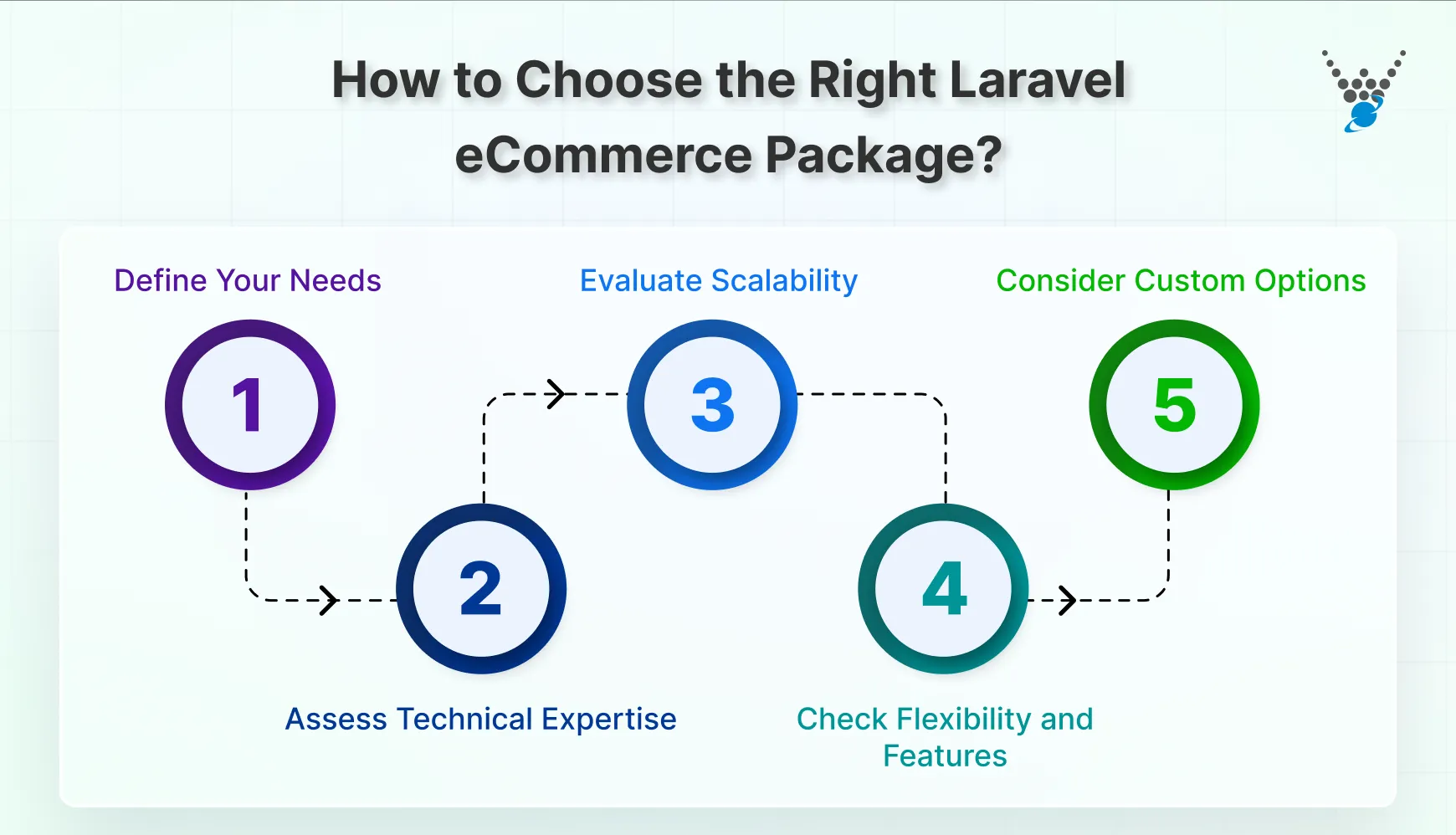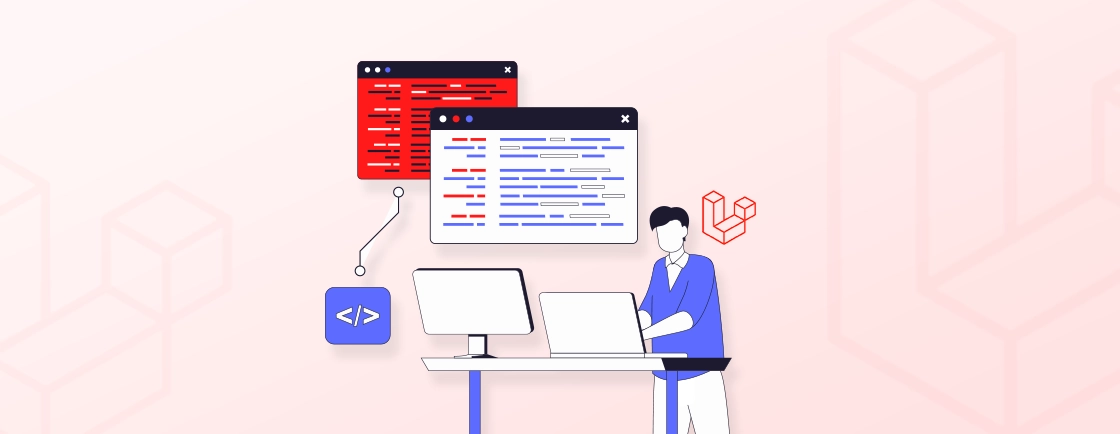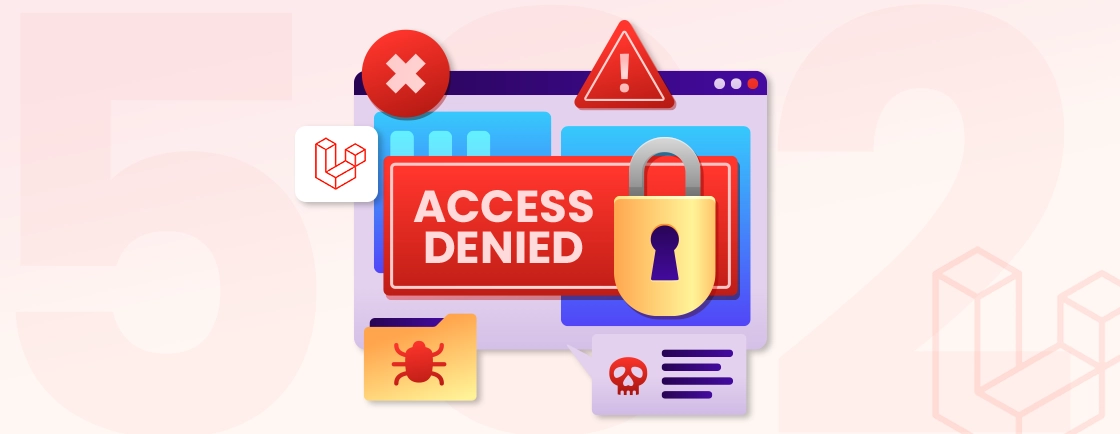Quick Summary
Laravel eCommerce packages give you a smart way to build powerful, secure, and scalable online stores without starting from zero. This blog explores the best Laravel eCommerce options, compares popular tools like Aimeos vs Bagisto, and shares a clear roadmap to help you choose the right fit. Whether you want speed, flexibility, or growth, this guide shows how to build a store that stands strong over time.
Table of Contents
Starting an online store can feel confusing. There are so many tools and options that it’s hard to know where to begin. That’s where the Laravel eCommerce package helps. They make it easier to build a store that works fast, looks professional, and grows with your business.
In this guide, we’ll look at seven top Laravel eCommerce packages that can change how you run your online store. We’ll dive into their unique strengths, compatibility, and ideal use cases. This will equip you with the knowledge to choose the perfect fit for your business aspirations. Let’s begin.
What are Laravel Packages?
Laravel packages streamline functionality and complex tasks. Think of them as self-contained code collections that integrate with Laravel’s core framework. Each package focuses on a specific area. This modular approach delivers several key benefits:
- Streamline Development. By leveraging pre-built, well-tested functionalities, you can reduce development time and effort.
- Maintainability and Updates. Packages are actively maintained by their communities. This translates to a more secure and reliable codebase for your project.
- Reusability. Whether you’re working on a new project or extending an existing one, packages help you to reuse functionalities across different applications.
While packages offer undeniable advantages, carefully evaluate each dependency before adopting it. Consider factors like the package’s community activity, maintenance status, and security reputation. Top of all it should be aligned with your project’s requirements.
What Makes Laravel the Best Choice for eCommerce?
Building an online store is more than just design. The framework you choose defines speed, security, and scalability. Laravel stands out for several reasons:
- Clean and Organized Structure: Laravel uses a clear and logical code structure. This makes development faster and easier to manage. Even beginners can understand the flow, while experienced developers can build complex features without confusion.
- Strong Security Features: Security is critical for any eCommerce site. Laravel includes built-in protections against threats like SQL injection, cross-site scripting, and data breaches. It also simplifies secure payment integrations and user authentication, keeping both store owners and customers safe.
- High Performance and Scalability: Laravel can handle stores of any size. Whether you have a small shop or a growing business, it manages traffic spikes, large product catalogs, and complex operations efficiently. This ensures your store stays fast and responsive.
- Rich Ecosystem and Packages: The Laravel ecosystem is full of tools and packages that speed up development. Laravel eCommerce packages let you add advanced features like multi-vendor support, subscriptions, and product management without starting from scratch.
- Active Community and Support: Laravel has a large, active community. This means tutorials, guides, and expert advice are always available. You’re never alone when solving problems or exploring new functionalities for your Laravel eCommerce project.
- Flexibility Across Projects: Whether you’re building a full Laravel eCommerce website, a small online shop, or exploring the best Laravel eCommerce CMS, Laravel adapts to your needs. You can scale features up or down without major changes.
Laravel comes out as a reliable partner for professional eCommerce development. Its combination of security, speed, flexibility, and strong community support makes it the ideal choice for anyone planning a serious online store. To understand how Laravel can be used to build full-fledged online businesses, need to know all about Laravel for eCommerce and how it powers scalable online stores.
7 Top Laravel eCommerce Packages
Selecting the right eCommerce package for your Laravel project can be a challenge. Each option offers unique features, strengths, and considerations. Worry not! This curated list showcases 7 top Laravel eCommerce Packages and provides valuable guidance to help you make an informed decision.
1. Bagisto
As we explore top Laravel eCommerce packages, let’s start with Bagisto. It is a name synonymous with open-source flexibility and comprehensive functionality. Bagisto is ideal for businesses of all sizes, from budding startups to established brands.
- Complete Storefront Solution. Manage products, users, promotions, payments, and more. All within Bagisto’s intuitive interface.
- Open-Source Freedom. Customize functionalities, integrate third-party extensions, and tailor the platform to your unique needs.
- Mobile-Responsive Design. Ensure a seamless shopping experience across devices.
- SEO-Friendly. Optimize your store for search engines. It lets you attract organic traffic and increase visibility.
- Multi-Vendor Marketplaces. A marketplace where multiple sellers can showcase and sell their products.
- Multi-Store Management. Efficiently manage multiple stores with unique settings and inventories within a single platform.
- Advanced Marketing Tools. Implement targeted promotions, discount codes, and loyalty programs to boost sales.
Bagisto excels in ease of use and customization. It is the perfect fit for highly complex or large-scale eCommerce projects requiring extensive custom development.
2. Laravel Shopping Cart
Next in our journey, we encounter the Laravel Shopping Cart. It is a lightweight, yet powerful shopping cart system. This package is specifically designed for integration with your existing Laravel applications.
- Effortless integration. Plug it directly into your Laravel app with minimal setup, leveraging familiar syntax and conventions.
- Cart management. Handle cart calculations, coupons, wish lists, and more. These built-in functionalities ensure a smooth shopping experience for your customers.
- Lightweight. Maintain the agility and performance of your Laravel app without unnecessary bloat.
- Customization. Extend functionalities through custom events, listeners, and service providers.
- Open-source and community-driven: Benefit from regular updates, community support, and access to various resources.
While Laravel Shopping Cart excels in core cart functionalities, it’s not a complete storefront solution. It is ideal for developers already invested in Laravel who seek a reliable and efficient shopping cart system. And it packs a force without weighing down your application.
3. Aimeos Laravel
Aimeos Laravel is a solution built for enterprise-grade eCommerce demands. Its feature-rich platform caters to large-scale projects. It is also a perfect option for businesses requiring extensive customization and scalability.
- Modular design. Choose only the functionalities you need, ensuring efficiency and flexibility.
- Extensive Customization. Adapt the platform to your specific business logic and workflow through its API and configuration options.
- Multi-Vendor Support. Manage complex marketplaces with multiple sellers, product offerings, and unique rules.
- Scalability. Accommodate high traffic volumes and product variations with confidence.
- API-First Approach. Integrate with external systems and leverage its RESTful API for headless commerce initiatives.
- Globalized and Multilingual. Support multiple languages and currencies, catering to international audiences.
While Aimeos Laravel offers exceptional power, it comes with a learning curve due to its extensive features and configuration options. If your goal extends beyond eCommerce into larger systems, excels in Laravel enterprise application development to ensure scalability and security for complex business needs.
4. LunarPHP
LunarPHP is a rising package, offering headless commerce architecture. It’s a modern approach that prioritizes flexibility and developer friendly tools. This empowers you to build unique and agile online store experiences.
- Headless Flexibility. Let’s develop decoupled storefronts and backend APIs. With this, you can cater to diverse use cases like mobile apps, progressive web apps, and custom interfaces.
- Developer-Centric. Clear documentation, active community support, and tools. Each of them is tailored for efficient development workflows.
- Modular Approach. Select only the functionalities you need from a collection of well-maintained packages. This benefits in keeping your project lean and focused.
LunarPHP offers flexibility, while it requires more technical expertise compared to some other packaged solutions. Building and managing a headless architecture might not be ideal for those with limited technical resources.
5. Vanilo
Vanilo stands out for its modular architecture and unparalleled commitment to developer experience. This package enables you to build tailored online stores that align with your business requirements.
- Flexibility. Select only the functionalities you need from a curated collection of well-maintained modules. This streamlined approach fosters agility and keeps your store lean and focused.
- API-First Mindset. Manage your store through a well-documented RESTful API. This enables you to conduct headless commerce implementations with your preferred front-end technologies.
- Open-Source. Grab the advantages of ongoing community contributions, and the freedom to customize existing modules.
- Customization Potential. Vanilo’s extensive configuration capabilities unlock virtually limitless possibilities. This allows you to tailor the platform to your precise vision and create a custom user experience.
Vanilo offers unparalleled customization and flexibility. But, it demands more technical skills compared to out-of-the-box solutions. Understanding Laravel and API interactions is important to unlock its full potential.
6. Shopper
The Laravel Shopper is a solution designed for ease of use and a smooth launch experience. No matter, if you are aiming for a complex online space or a small online storefront, Shopper offers a compelling option.
- User-Friendly Interface. Navigate the platform with an intuitive interface. Even if you possess limited technical expertise.
- Rapid Set-up. Get your online store up and running with minimal configuration and fuss. This frees you to focus on your products and branding.
- Stunning Design. Shopper offers a pre-designed storefront that makes a positive first impression on customers.
- Essential Features. Manage products, orders, customers, and promotions with built-in functionalities.
- Community and Support. Leverage the active Shopper community and available support resources to get assistance whenever needed.
Laravel Shopper prioritizes ease of use over extensive customization. It’s ideal for quick launches and well-suited for specific types of products. While it might not cater to complex business models or unique design requirements.
7. Bento
As we conclude our exploration of top Laravel eCommerce packages, we meet Bento. It is a newcomer rising in popularity among developers. This package prioritizes developer experience and rapid prototyping, empowering you to build modern, API-driven eCommerce experiences.
- Lightning-Fast Prototyping. Experiment with new ideas and repeat thanks to Bento’s streamlined focus on API interactions.
- API-Focused Design. Build storefronts and manage everything through a comprehensive RESTful API.
- Modern Toolset. Leverage modern technologies like GraphQL and React for building performance and flexible storefronts.
- Open-Source Foundation. Benefit from regular updates, community contributions, and the freedom to customize or extend functionalities.
While Bento benefits from rapid prototyping and developer experience, it’s still evolving and might lack some features. Complex store management or extensive customization might require additional integration or development effort.
Want any of these packages integrated in your Laravel web application? Then consult with our Laravel development company.
How to Choose the Right Laravel eCommerce Package?
Selecting the right Laravel eCommerce package is crucial for building a store that works efficiently today and grows tomorrow. The “best” package depends on your goals, technical skills, and business needs. To help you make the right choice, here is what we recommend:

Define Your Needs
Start by understanding your store’s purpose. Are you building a B2C shop, a B2B platform, or a marketplace? Identify your target audience and their shopping habits. Make a list of must-have features, like multi-vendor support, subscriptions, or advanced search.
Also, consider your budget and technical capabilities. Decide whether ease of use, deep customization, or a headless architecture is most important for your project.
Assess Technical Expertise
Your team’s skills should align with the package you choose. Some packages are beginner-friendly, while others assume strong Laravel knowledge. If you plan to work with APIs, headless setups, or heavy customizations, ensure your team can handle it. Understanding your own limits prevents frustration and delays.
Evaluate Scalability
Think ahead. How many products will your store have? What traffic volume do you expect? A good package should grow with your business. You don’t want performance issues when your store becomes popular. Scalability ensures long-term stability and avoids costly migrations later.
Check Flexibility and Features
Some packages come with pre-built features, which can save time. Others offer extensive customization, letting you tweak every detail. Consider whether you’ll need integrations with payment gateways, shipping providers, or CRM tools. The right package should balance ready-to-use functionality with flexibility for future growth. For businesses that prioritize customer management, build a CRM with Laravel to enhance engagement and streamline operations.
Consider Custom Options
Sometimes, pre-built packages aren’t enough for complex or niche requirements. Hiring experienced Laravel developers or exploring custom development can be worthwhile. Custom solutions offer maximum flexibility but may take longer and cost more.
Weigh the trade-offs between convenience, control, and ongoing maintenance. Laravel’s flexibility also makes it an excellent choice for unique solutions — for example, you can build a property listing app with Laravel to handle listings, filters, and lead management with ease.
Choosing a Laravel eCommerce package is about matching your store’s needs with the package’s strengths. By clearly defining your requirements, understanding your technical capacity, and thinking about growth, you can pick a package that sets your online store up for long-term success.
Let’s Conclude
In this comprehensive guide, we’ve explored the evolving world of Laravel eCommerce packages. While uncovering seven top contenders and empowering you to make an informed decision for your online store.
From the versatile Bagisto to the headless-focused LunarPHP. Each package offers unique strengths and caters to specific needs. Remember, the ideal choice depends on your project’s vision. Consider your technical expertise, budget, scalability requirements, and desired level of customization.
Eager to launch your online store with the perfect Laravel eCommerce package? Let our team of Laravel developers for hire help you through it.
FAQs About Laravel eCommerce Package
Do Laravel eCommerce packages support multiple payment gateways?
Yes, most Laravel eCommerce packages support integrations with multiple payment gateways. Some offer built-in integrations with popular options. While others provide frameworks for custom integrations.
Are Laravel eCommerce packages suitable for large-scale projects?
It depends on the package and your specific needs. Packages like Aimeos Laravel and LunarPHP cater to complex, large-scale projects. They offer features like scalability and multi-vendor support. Assess your project requirements and compare the functionality offerings of each package.
Can I migrate an existing eCommerce website to a Laravel eCommerce package?
Migration depends on your current platform and chosen package. Some packages offer migration tools or support services, while others require custom development. Consider the complexity of your existing website and research migration options. They are usually provided by the specific package you pick.
Build Powerful Laravel Applications
Learn how to leverage Laravel's powerful features for efficient and scalable web development.





